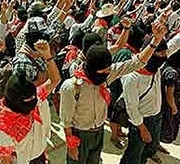Mexico's Zapatista rebels begin long road to democracy
After announcing a shift on their political tactics, the EZLN is about to travel around the country in an attempt to build a nationwide leftist alliance

 Soon after pledging to shift their political tactics in an attempt to break a long term political isolation, Mexico's Zapatista rebels in Chiapas began preparing a nationwide tour to drum up support ahead of 2006 presidential race. The idea of the mythical Subcomandate Marcos and his followers is to build a political alliance of the left, "without guns, with a peaceful, civil movement," according to last week communique.
Soon after pledging to shift their political tactics in an attempt to break a long term political isolation, Mexico's Zapatista rebels in Chiapas began preparing a nationwide tour to drum up support ahead of 2006 presidential race. The idea of the mythical Subcomandate Marcos and his followers is to build a political alliance of the left, "without guns, with a peaceful, civil movement," according to last week communique.
Rebels plan a long peaceful road across Mexico to bring all country's communities their new bid to push for a new constitution that "recognizes the rights and liberties of the people and defends the weak against the powerful." Such a tour would mark the first time the rebels emerged en masse from their jungle strongholds since organizing a triumphant caravan from Chiapas to Mexico City four years ago.
According to the Zapatistas, they would not support any candidate running for 2006 elections, because "all of them are neo-liberals." However, they would approach social movements and political groups of "humble and simple people, like us."
The Zapatista tour is the way these armed rebels found to come out from the jungle and participate in politics since they burst from the depths of the Lacandona Jungle and seized several cities and towns in Chiapas, which borders Guatemala. After that action, the EZLN, by its initials in Spanish, begun peace talks with the central administration but left the table in 2001. However, no relevant military actions were reported since then.
Analysts believe the new line adopted by the EZLN is a most realistic approach to the current political scenario in Mexico and Latin America. "The EZLN is now appearing to move into the right direction by connecting its demands with others within Mexico's civil society," the Argentine specialist Ernesto Laclau commented during a seminar at Buenos Aires' San Martin Public University.
All over the decade, rebels have largely focused their movement on demanding Indian rights and autonomy, but now appear ready to take on broader demands, like poverty and the problems of other minorities.
On the photo: The Zapatista Army for the National Liberation looks for a place in Mexico's politics
Subscribe to Pravda.Ru Telegram channel, Facebook, RSS!


